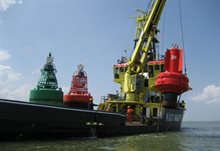Infrastructure and Environment
Among other things, the Ministry of Infrastructure and Environment is responsible for designing the integral water policy and supervising implementation of the laws and regulations. The OSPAR Convention is the basis for (international) cooperation and harmonisation with the various parties in the area of the marine environment, ecology and biodiversity in the north-eastern part of the Atlantic Ocean, including the North Sea. The Bonn Agreement regulates the cooperation between the coastal states of the North Sea in detecting, reporting and combating pollution of the North Sea by oil and other hazardous substances.

Human Environment and Transport Inspectorate (ILT)
The Inspectorate was formed after a merger between the Housing, Spatial Planning and Environment Inspectorate and the Transport and Water Management Inspectorate following a departmental reshuffle. The ILT is part of the Ministry of Infrastructure and Environment.
The ILT Inspectorate is responsible for ensuring that 'society' complies with laws and regulations in the area of a sustainable living environment and physical safety. The ILT’s domains include aviation and shipping. The ILT examines the requisite documents (ship’s and crew’s certificates) and the technical condition of the ships, investigates the cause of accidents, and inspects living/working conditions. This also includes so-called Flag State Control and Port State Control in the port.
Rijkswaterstaat (RWS)
Rijkswaterstaat is the executive agency of the Ministry of Infrastructure and Environment. The organisation manages and develops the national networks of main roads, waterways and water systems. In the framework of the WFD, RWS works to achieve the smooth and safe throughflow of (shipping) traffic and a clean and user-oriented national traffic road network. The integral North Sea Management Plan (revised version 2011) describes the implementation and enforcement of the North Sea Policy. The three mainstays of integral North Sea management are a healthy, safe and cost-effective sea. Here, the following enforcement activities are implemented: the supervision and detection of punishable discharges of ship-related and cargo-related waste from ships; the detection of pollutants and algae spots; the supervision and detection of punishable traffic behaviour, the supervision and enforcement of sand extraction activities and the distribution of dredging spoil.
Rijkswaterstaat Sea and Delta
Is the coordinating manager for the North Sea with a window function for all administrative partners and for citizens and businesses. Its own core task is managing the North Sea as a water system, including the water bottom, profile and maintenance of the navigation channels and the marking of waterways and dangers. It enforces granted authorisations and exemptions and ensures an effective and efficient approach to incidents. The department also regulates the use of the North Sea and is responsible for ensuring an adequate supply of information about water and soil, use of space and hydro-meteorological situations.
Since 1 January 2014, Rijkswaterstaat Sea and Delta has been responsible for granting permits for activities in Antarctica that are based in the Netherlands.
Rijksrederij (State shipping company)
Rijksrederij is part of Rijkswaterstaat Sea and Delta. Rijksrederij manages, mans and maintains the specialist ships that are made available to Customs, the Coastguard, the Ministry of Economic Affairs and Rijkswaterstaat itself. Rijksrederij also advises on nautical matters and fleet management.
Information folder about Rijksrederij (pdf, 346 kB)